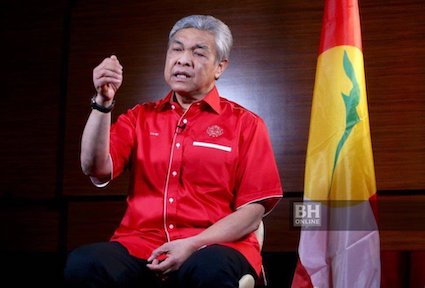Commentary: UMNO president Zahid Hamidi’s many headaches

UMNO president Ahmad Zahid Hamidi is typically the embodiment of calm. Going forward, however, Zahid and his faction will have to hunker down to confront multiple challenges, says ISEAS-Yusof Ishak’s Francis E Hutchinson.
Francis E Hutchinson, CNA
Typically, Ahmad Zahid Hamidi, the President of the United Malays National Organization (UMNO), is the epitome of suave.
These days, however, he appears to be edgy, ruffled, and unsure. In part, this is due to the new normal in Malaysian politics, characterised by slimmer parliamentary majorities, internal coalition fissures and UMNO’s non-dominant position.
The last issue cuts deeply, as UMNO leaders are accustomed to being the first without equals in any coalition. And, given that their party contributes the highest number of MPs to the sitting Perikatan Nasional (PN) administration, they keenly feel the injustice of the party not occupying the prime ministership and choice Cabinet positions.
The proposed salve for the wound is for the grand old party to return to the apex of power – via a newly-forged parliamentary majority or early elections.
A SENSE OF URGENCY
Bolstering UMNO’s profile has consumed Zahid’s attention over the past months. There is a sense of urgency as the party’s similarities to Prime Minister Muhyiddin Yassin’s Parti Pribumi Bersatu Malaysia (Bersatu) means its support base may be cannibalised.
Nonetheless, some of Zahid’s recent moves are surprising. For example, he wrote to Muhyiddin in late February, stating that UMNO would not jointly contest the next election with PN.
Beyond jumping the gun, this move does not make tactical sense as it is likely to encourage Muhyiddin to put off elections and further expand into UMNO territory.
There are several factors for Zahid’s angst. First, once renowned for its discipline and internal cohesion, UMNO is now divided and Zahid is looking increasingly vulnerable.
There are three visible groups in the party. The first is “the Court Cluster”, led by the likes of Zahid, former PM Najib Razak, and senior party apparatchiks who face a bevy of corruption cases. They are seeking early elections and clemency for their legal travails.
The second comprises members such as Hishammuddin Hussein and Khairy Jamaluddin, who enjoy good relations with Muhyiddin, hold Cabinet positions and are less eager to go for elections.
The third group consists of party moderates, such as UMNO Deputy President Mohamad Hasan. Largely from the south of the country, they are not in the Cabinet and would like UMNO to return to power – but are not necessarily keen for the Court Cluster to regain control.
ZAHID’S HEADACHES
This infighting increases Zahid’s image problem. For all of living memory, the UMNO party president has been the prime minister.
However, given that Zahid is not, he has less wherewithal to demand compliance. There are now frequent calls for him to step down, including from party veterans such as former Deputy Prime Minister Musa Hitam.
UMNO’s party elections are due soon and Zahid may be challenged by one or both of the other groups for his position. The Supreme Council will shortly decide whether to hold party elections this year or, as is allowed by the party’s constitution, delay them by up to 18 months.
Given the party president’s prerogative to appoint a number of its members, it is likely that UMNO’s apex body will vote to delay the election.
While this will give Zahid some breathing room, he faces another, bigger source of stress.
The UMNO president faces no less than 87 charges of criminal breach of trust, bribery, and money laundering. The trial for the first 47 charges pertains to transactions totalling RM117 million (US$28 million) linked to his charitable foundation Yayasan Akalbudi.
Since it began in November 2019 it has been delayed no less than 15 times due to requests for Zahid to travel to Sabah for the state elections or to self-isolate following a contact with a COVID-19 case.
Regardless, the prosecution has called on 90 witnesses and has but a handful to go. Given the amount of evidence presented, it is unlikely the High Court will dismiss the case, opting, instead, to require Zahid to enter a defence. Despite foreseeable delays, it is likely that the trial will conclude this year.
A POTENTIAL LEADERSHIP CHALLENGE
In the event of a conviction, it is unlikely that Zahid will go to prison, as he has the resources to contest the decision at the Appeals Court and then the Federal Court. However, more worrying for him will be the effective end of his party presidency.
A provision of the influential Societies Act states that anyone sentenced to longer than one year’s imprisonment or a fine greater than RM2,000 will be barred from occupying any office-bearing position in a registered society such as a political party.
With Najib Razak also barred from contesting following his conviction last year, Zahid’s elimination would throw the contest for the party’s leadership wide open.
In the interim, Deputy President Mohamad Hasan would assume leadership of the party. Well-liked and unburdened by corruption allegations, he would be a strong candidate.
Faced with the mounting health and economic costs of COVID-19, the conviction of a senior UMNO politician would be a boon to Muhyiddin Yassin’s administration.
And, UMNO, which has sought to capitalise on Perikatan Nasional’s missteps would be forced to take a hard look inward.
Francis E Hutchinson is Senior Fellow and Coordinator of the Malaysia Studies Programme at the ISEAS-Yusof Ishak Institute in Singapore.

